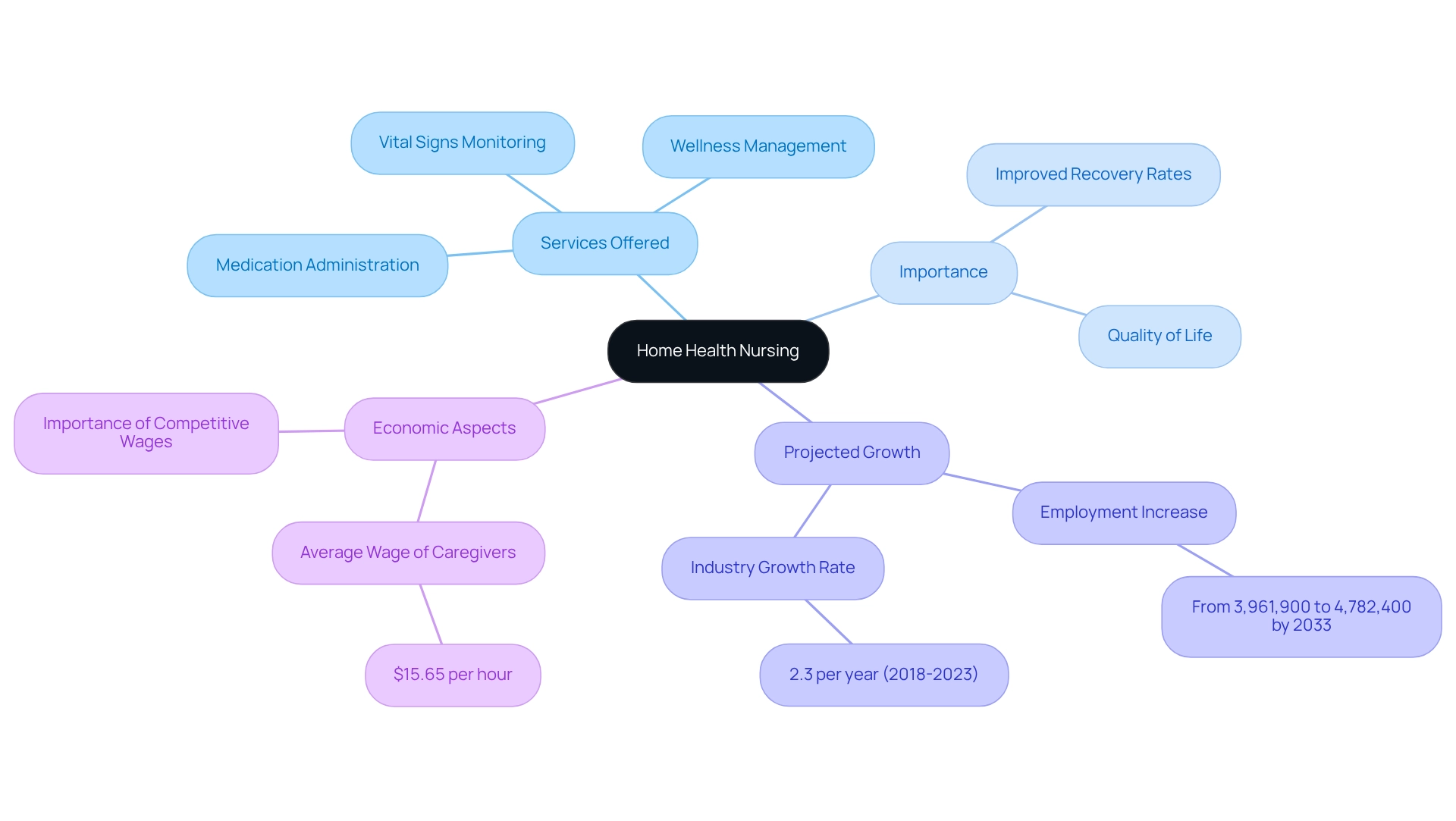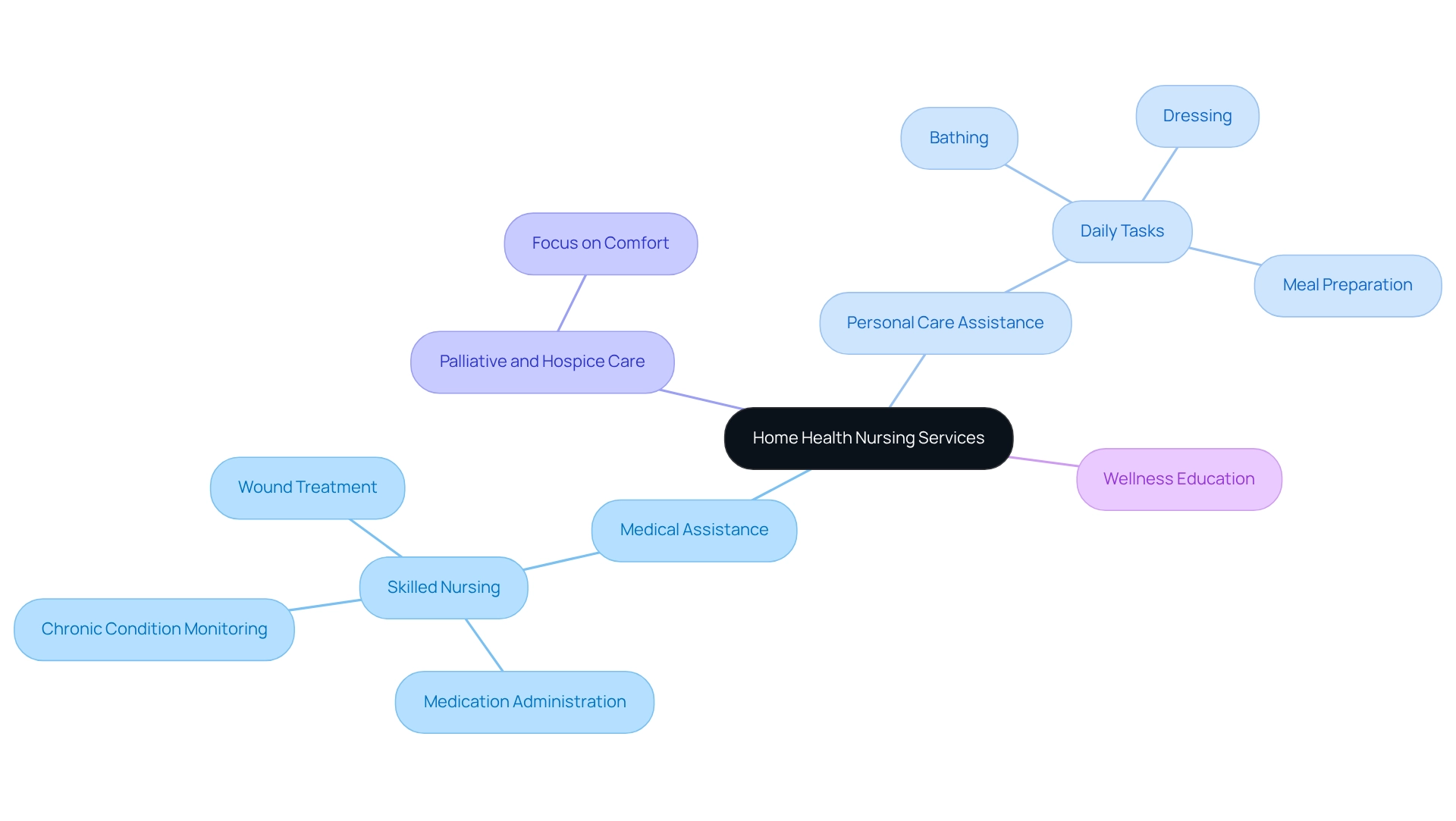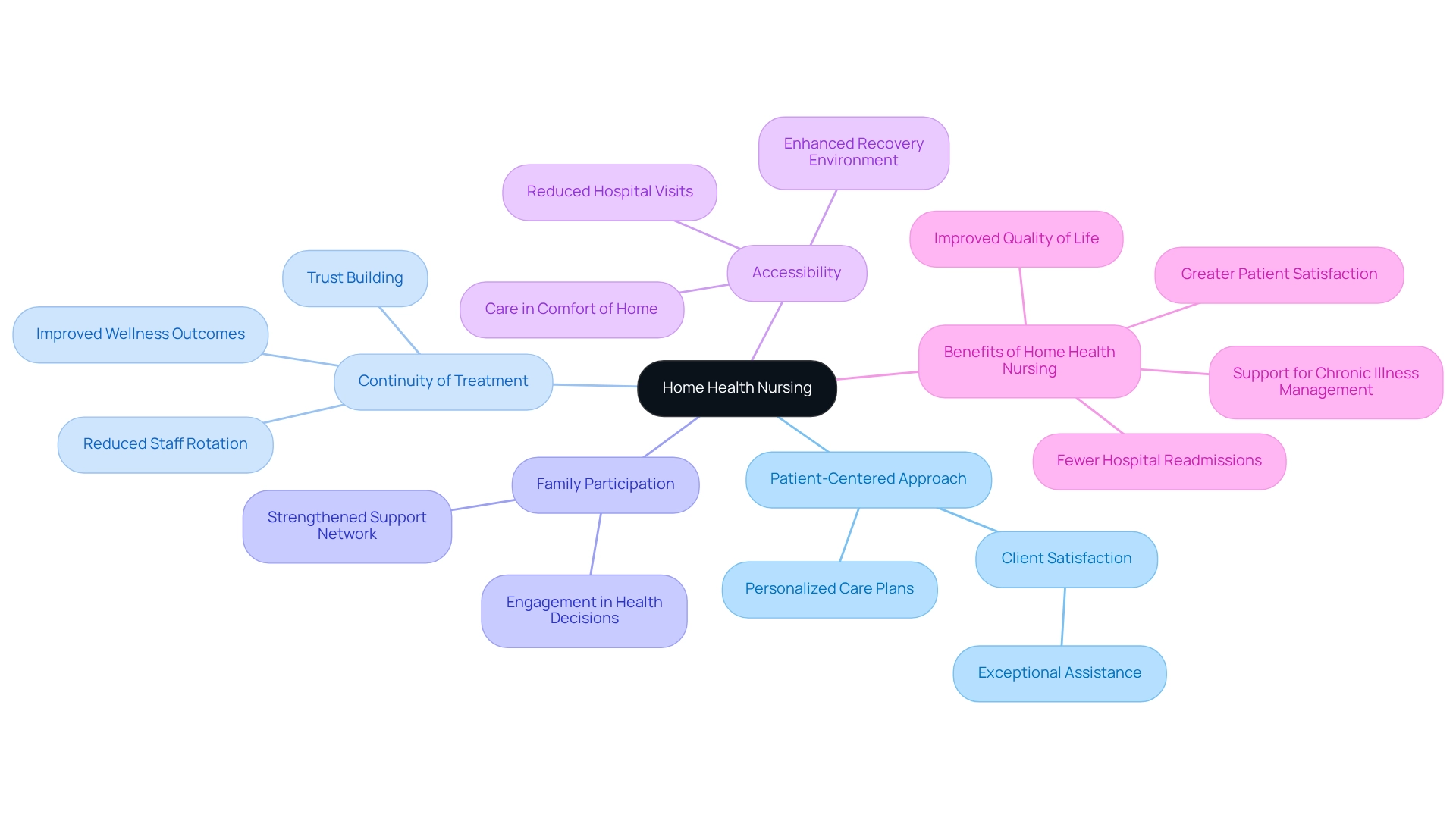Overview
Home health nursing plays a vital role in delivering personalized medical care and support right in the comfort of patients’ homes. This is especially important for those who are elderly, disabled, or recovering from illness. By choosing home health nursing, you not only enhance recovery rates but also improve the overall quality of life for your loved ones.
This compassionate approach fosters independence and dignity, making it an essential component of modern healthcare. As the demand for these invaluable services continues to rise, it’s comforting to know that help is available. We understand the challenges you may face, and we are here for you every step of the way.
Imagine the peace of mind that comes from knowing your loved ones are receiving the care they need in a familiar environment. With home health nursing, you can rest assured that their health and well-being are prioritized, allowing them to thrive in their own space.
Introduction
In a world where healthcare is increasingly shifting towards personalized and home-based solutions, home health nursing emerges as a vital lifeline for countless individuals. This specialized field offers a broad spectrum of services designed to cater to the unique needs of patients, particularly those who are homebound due to age, illness, or disability. By providing care within the comforting confines of home, these dedicated professionals not only enhance recovery rates but also significantly improve the quality of life for their patients.
With the growing demand for such services, driven by an aging population and evolving healthcare preferences, home health nursing stands at the forefront of a transformative approach to patient care, emphasizing compassion, independence, and dignity. As families navigate these changes, understanding the scope, history, and benefits of home health nursing becomes essential. We are here for you, ensuring that your loved ones receive the best possible support in the comfort of their own home.
Define Home Health Nursing: Scope and Importance
Home health nursing encompasses a variety of medical services delivered right in the comfort of an individual’s home, focusing on enhancing, preserving, or recovering well-being. This practice is especially crucial for those who are homebound due to illness, disability, or age. Home health nurses provide personalized support, which includes administering medications, monitoring vital signs, and guiding individuals and their families in wellness management.
The significance of home nursing is underscored by its ability to offer assistance in a familiar environment, which has been shown to improve recovery rates and elevate the overall quality of life, particularly for seniors and those with chronic conditions. Currently, around 15 million Americans benefit from in-home assistance services, highlighting the growing reliance on home health nursing and the vital role it plays in meeting the needs of our aging population.
Moreover, encouraging individual participation in treatment strategies is essential, as it empowers individuals to take an active role in managing their health. This collaborative approach not only promotes independence but also honors the dignity of patients. As the home support sector continues to expand, with an expected increase in jobs for personal aides projected to rise from 3,961,900 to 4,782,400 by 2033, it becomes clear that the demand for nursing services in residences is on the rise, further emphasizing the importance of this field.
In 2025, the role of home health nursing will be even more critical, as it addresses the unique needs of seniors, ensuring they receive necessary medical attention while enjoying the comfort of their homes. The availability of CNA/HHA caregiver services can significantly enhance the well-being and quality of life for seniors by providing personalized assistance tailored to their needs, helping them maintain their independence and dignity.
Without these essential services, seniors may encounter numerous challenges, including health decline, poor nutrition, and social isolation, all of which can severely impact their overall well-being. Understanding the typical wages of certified caregivers, currently at $15.65 per hour, is vital for agencies aiming to attract and retain qualified personnel. This economic aspect directly influences the quality of care provided, as competitive wages are crucial for upholding high standards of service.
As Hinck observes, “If you possess the self-starting responsibility to consistently enhance your abilities, you could prosper in a domestic care environment.” This statement reinforces the importance of commitment and professionalism in delivering effective home support. Additionally, the emotional and psychological benefits of home nursing are significant; receiving assistance in a familiar setting greatly enhances the overall well-being and happiness of seniors.
In summary, home health nursing not only supports recovery and improves quality of life but also plays an essential role in the evolving landscape of healthcare, emphasizing the need for compassionate, tailored support in residential settings. For more information on how Best Care Nurses Registry can assist you or your loved ones, we’re here for you—call (888) 203-2529 to schedule a consultation.

Explore the History and Evolution of Home Health Nursing
The beginnings of home health nursing can be traced back to the mid-19th century, profoundly shaped by innovators like Florence Nightingale, who championed the importance of nursing support in patients’ homes. Initially, domestic assistance was primarily the responsibility of relatives or volunteers. However, with advancements in medical knowledge and the evolution of care systems, the concept of professional home health nursing began to emerge. The establishment of home health nursing agencies in the 1960s marked a pivotal moment, formalizing the provision of skilled nursing services in residential environments.
As time has progressed, the demand for home health nursing services has surged, driven by an aging population, advancements in medical technology, and an increasing emphasis on patient-centered care. In the United States, approximately 4.5 million patients receive healthcare services at home each year, underscoring its vital role in the healthcare continuum. The anticipated growth of domestic healthcare and personal aides is expected to rise by 34% from 2019 to 2029, significantly outpacing the average growth rate for all professions. This forecasted expansion highlights the increasing need for domestic care services as families seek trustworthy assistance for their loved ones.
Currently, home health nursing includes a wide array of services, such as skilled nursing, rehabilitation, and palliative support. This evolution reflects a growing recognition of the importance of personalized care in enhancing outcomes and quality of life. Services such as assistance with personal hygiene, meal preparation, and medication management not only promote well-being but also provide emotional support and companionship, addressing the social isolation many seniors face. Client satisfaction surveys serve as essential tools to assess the quality of residential healthcare services, ensuring they meet the needs and expectations of individuals and their families. As Adam Grundy, a supervisory statistician, notes, ‘The increase in revenue across home wellness services emphasizes the shifting options chosen by seniors and their families,’ further reinforcing the significance of home health nursing in today’s healthcare landscape.

Detail Services Offered in Home Health Nursing
Home health nursing services encompass a wide array of options tailored to meet the unique needs of every individual. These services can be categorized into three primary areas: medical assistance, personal support, and support services.
-
Medical Assistance: This includes Skilled Nursing, which involves administering medications, providing wound treatment, and monitoring chronic conditions. Effective management in these areas is crucial, as 14.1% of home care episodes lead to hospitalization due to insufficient attention. This statistic underscores the importance of skilled nursing, especially in the context of home health nursing, for preventing complications and ensuring safety for individuals. In Australia, for instance, approximately 1.6 million people received home-based support services in 2020-2021, highlighting the growing reliance on such rehabilitation services.
-
Personal Care Assistance: Nurses assist with daily tasks like bathing, dressing, and meal preparation, ensuring that individuals maintain their dignity and quality of life. Without CNA/HHA caregiver services, seniors may face significant risks, such as deterioration, poor nutrition, and increased social isolation, which can profoundly impact their overall well-being. Additionally, these services provide emotional support and companionship, essential for mental health.
-
Palliative and Hospice Care: These services offer vital comfort and support for individuals with terminal illnesses and their families, focusing on quality of life during challenging times.
-
Wellness Education: Nurses educate individuals and caregivers on managing medical conditions and enhancing well-being, empowering them to take an active role in their care.
These services are designed with flexibility in mind, allowing adjustments based on the individual’s evolving needs. This adaptability ensures continuity of care and enhances the overall experience for those receiving treatment. The ongoing recovery from the COVID-19 pandemic has increased the demand for home health nursing services, particularly as many adult day centers faced closures or limited operations. Furthermore, regulatory support has expanded, promoting aging in place and ensuring patient safety through increased funding for home health nursing programs. By prioritizing home health nursing, families can alleviate stress and focus on their personal lives, confident in the knowledge that their loved ones are receiving the highest quality of care.

Highlight Key Characteristics and Benefits of Home Health Nursing
Home health nursing exemplifies a patient-centered approach, adaptability, and a strong commitment to comprehensive well-being. It prioritizes personalized care, ensuring that each care plan is tailored to meet the unique needs and preferences of every patient. At Best Care Nurses Registry, our dedicated team, including skilled professionals like Brianna and Sherie, collaborates closely with clients to develop support plans that truly reflect their specific circumstances. Clients often express their satisfaction, sharing sentiments like, ‘The assistance I received was exceptional and truly personalized to my needs.’
Continuity of treatment is another cornerstone of our service. Ongoing support from the same medical practitioners fosters trust and significantly enhances wellness outcomes. Research indicates that over 90% of individuals report contentment with their domestic support experiences. Furthermore, minimizing the rotation of nursing staff during home visits can lead to improved results for those receiving care.
Family participation is vital in our approach. Actively engaging family members in health decisions strengthens the support network for individuals, fostering a collaborative approach to health management. We encourage family involvement to ensure that support aligns seamlessly with the individual’s lifestyle and preferences.
Accessibility is a key benefit of our services. By providing care in the comfort of the individual’s home, we minimize the need for hospital visits and create a more relaxed recovery environment. With the compassionate support of Best Care’s attendants, clients can receive high-quality assistance without the stress of travel. The advantages of home health nursing are profound, leading to greater satisfaction among individuals, fewer hospital readmissions, and an improved quality of life. By offering support in a familiar environment, home health nursing promotes independence and dignity, allowing patients to maintain their routines and lifestyles while receiving essential medical assistance. This approach is increasingly recognized as a vital component of effective disease management, particularly for chronic illnesses and the elderly, especially as healthcare systems worldwide shift towards more personalized, home health nursing solutions. For instance, the transition from hospital to residential support underscores the effectiveness of domestic nursing in facilitating recovery in familiar settings. Additionally, Best Care’s assistance with long-term insurance claims enhances the overall client experience, helping families navigate insurance complexities while focusing on care. As Visa Väisänen noted, the average duration of daytime recovery was 75 minutes, highlighting the benefits of nursing care in relation to recovery times and patient satisfaction.
To learn more about how Best Care Nurses Registry can assist you or your loved ones with personalized home health care solutions, please call us at (888) 203-2529.

Conclusion
Home health nursing is truly a cornerstone of modern healthcare, offering essential services that cater to the unique needs of individuals in the comfort of their own homes. The scope of home health nursing is vast, encompassing skilled medical care, rehabilitation, personal assistance, and emotional support. This holistic approach not only addresses physical health but also fosters dignity and independence, especially for seniors and those with chronic conditions. As the demand for these services continues to rise, driven by an aging population and a preference for home-based care, the role of home health nursing becomes increasingly vital.
Historically rooted in the principles established by pioneers like Florence Nightingale, home health nursing has evolved significantly. Today, it reflects a commitment to personalized care, continuity, and family involvement, which are critical in enhancing patient outcomes and satisfaction. With projections indicating substantial growth in the home health sector, it is clear that this field will play an essential role in the future of healthcare, ensuring that patients receive tailored support that aligns with their lifestyles and preferences.
In conclusion, the benefits of home health nursing extend far beyond medical assistance; they encompass emotional well-being, improved recovery rates, and a profound respect for the dignity of patients. By prioritizing personalized and compassionate care, home health nursing not only transforms individual lives but also strengthens the healthcare system as a whole. For families seeking reliable support for their loved ones, understanding and embracing the value of home health nursing is crucial in navigating the complexities of care in an evolving healthcare landscape. Remember, we’re here for you, and your comfort is our priority.
Frequently Asked Questions
What is home health nursing?
Home health nursing encompasses a variety of medical services delivered in an individual’s home, focusing on enhancing, preserving, or recovering well-being, particularly for those who are homebound due to illness, disability, or age.
What services do home health nurses provide?
Home health nurses provide personalized support that includes administering medications, monitoring vital signs, and guiding individuals and their families in wellness management.
Why is home health nursing significant?
Home health nursing is significant because it offers assistance in a familiar environment, which has been shown to improve recovery rates and elevate the overall quality of life, especially for seniors and those with chronic conditions.
How many Americans currently benefit from home health nursing services?
Approximately 15 million Americans benefit from in-home assistance services.
What is the projected job growth for personal aides in the home support sector?
The number of jobs for personal aides is projected to rise from 3,961,900 to 4,782,400 by 2033.
How does home health nursing empower individuals?
Home health nursing encourages individual participation in treatment strategies, empowering individuals to take an active role in managing their health, promoting independence, and honoring their dignity.
What challenges might seniors face without home health nursing services?
Without these essential services, seniors may encounter challenges such as health decline, poor nutrition, and social isolation, which can severely impact their overall well-being.
What are the typical wages for certified caregivers?
The typical wages for certified caregivers are currently around $15.65 per hour.
What are the emotional and psychological benefits of home health nursing?
Receiving assistance in a familiar setting greatly enhances the overall well-being and happiness of seniors.
How does home health nursing fit into the evolving landscape of healthcare?
Home health nursing supports recovery and improves quality of life, playing an essential role in the evolving healthcare landscape by providing compassionate, tailored support in residential settings.











